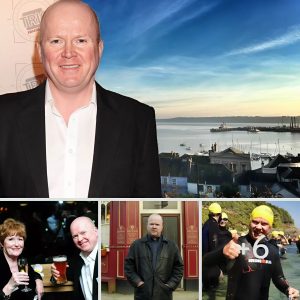In a world obsessed with youth, EastEnders legend Michelle Collins is pushing back with grace, grit, and purpose. Now 62, the actress who brought Cindy Beale to life in 1988 is redefining what it means to age on screen — and off. After a brief hiatus, Michelle recently returned to Albert Square, not just as a fan-favourite character but as a powerful symbol for women often erased by the television industry once they reach a certain age.
During a candid interview on BBC Breakfast, Collins shared how proud she is of EastEnders for giving older actresses meaningful storylines. When Cindy returned to the soap, she didn’t fade into the background — she commanded it. “I’m just really happy that we are embracing older women on screen,” Michelle explained. “And giving them big stories.” Her sentiments echo the wider call for inclusivity in casting, where life experience is seen as an asset rather than a limitation.
However, Michelle is quick to point out that this progressive approach remains an exception, not the norm. “TV isn’t great for women of a certain age,” she admitted in a Radio Times interview. “But soaps are.” Through her character and her own experiences, Michelle makes a compelling case: older women still have so much to say — and deserve the space to say it.
The next chapter of her storytelling takes place far from Walford. Michelle is preparing for a one-woman show at the Edinburgh Fringe Festival, titled Motorhome Marilyn. The inspiration for the show came from a striking moment years ago in Los Angeles, where Michelle saw a woman — dressed as Marilyn Monroe — emerge from a dilapidated motorhome, pop a coin into a parking meter, and vanish. That surreal image stayed with her for decades. Now, it forms the backbone of a character study that explores ambition, identity, and the burden of chasing a dream in a world that favors youth over wisdom.
The play follows a woman obsessed with Marilyn Monroe, aspiring to stardom while grappling with the realities of ageing and isolation. In choosing to portray this character solo, Michelle is stepping firmly out of her comfort zone. “I’ve been ambitious with this,” she admitted. And why not? As she sees it, growing older should be about pushing boundaries, not retreating from them.
Still, the journey hasn’t always been empowering. Michelle admits to some sobering fears about ageing, including the possibility of memory loss and being unable to work — a terrifying thought for someone whose identity is so tied to her profession. “That’s what scares me,” she confessed in an interview with The Guardian. These are not just personal fears but professional ones, too. At 45, she was told by a Hollywood manager that she was “too old” for success in the States. If that wasn’t cruel enough, the manager later complained that Michelle’s perfume “made her feel sick.” It’s a telling snapshot of the shallow and unforgiving standards that often plague women in entertainment.
But despite that rejection, Michelle’s career endured — and evolved. From Doctor Who to Coronation Street, from Casualty to The F Word, she’s shown remarkable range across genres. Yet Cindy Beale remains her defining role — not just for audiences but for Michelle herself. Her return to EastEnders is not a retreat into familiarity but a statement: she’s still here, and she still matters.
Outside of drama, Michelle is also showing her lighter side. She’s set to appear on BBC One’s Blankety Blank, joining a lively celebrity panel including Josh Widdicombe, Judi Love, Aisling Bea, Kojey Radical, and Jedward. Hosted by Bradley Walsh, the game show offers a refreshing contrast to the weightier subjects she’s been tackling — proof that she’s more than capable of navigating between comedy, drama, and stage.
Ultimately, Michelle Collins is far more than Cindy Beale. She is a storyteller, a trailblazer, and an unflinching voice for older women in media. Whether on Albert Square or the Fringe stage, she continues to challenge expectations — not for shock value, but because the truth still needs telling. As she puts it: “We have got voices, we have got stories — and they should be heard.”
With Motorhome Marilyn, Michelle invites us to witness what happens when a woman refuses to be written off. It’s not just a performance — it’s a revolution.





